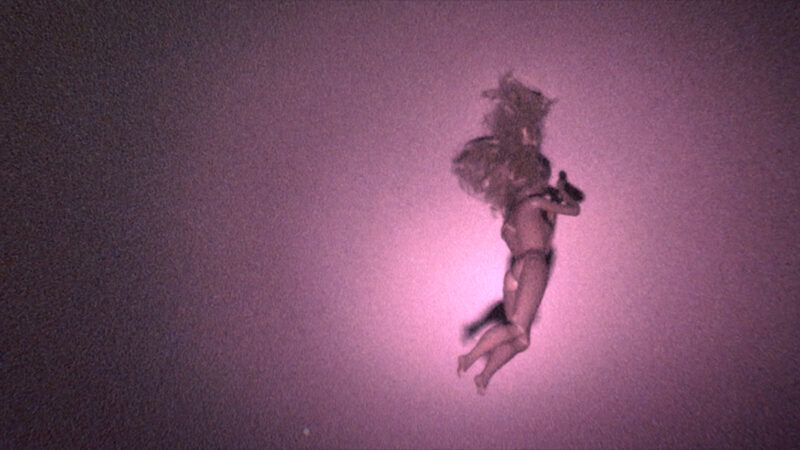Review: Skinamarink
Horror in your head.

Say you're a little kid. You're four years old and your name is Kevin. You and your sister Kaylee—she's six—are wandering around the house in the middle of the night searching for your mom and dad. They seem to have disappeared. The two of you are alone. Or are you? It feels like there's someone else here—or something. What is going on?
Well, Kevin, it looks like you and Kaylee have been dropped into a mini-indie horror movie by first-time Canadian writer-director Kyle Edward Ball, who shot Skinamarink (the title of a singalong song on an old kiddy TV show) with borrowed equipment on a partly crowdfunded budget of $15,000 (next to nothing, basically). Big ups to Ball for trying to do something new in the crowded horror field, and with such minimal means. But the results of his endeavor, while striking in technical ways, are mixed. In the early going, the movie does capture the skittery unease of two scared kids alone in the dark, spooked by looming shadows and sudden, strange sounds (the creak of a door, the muffled thump of something hitting the carpeted floor). But by the end, after offering us virtually no full-on shots of a human face, or anything at all in the way of action, the movie is undone by its excessive, 100-minute length. It feels at least half an hour too long.
Ball filmed his actors—Lucas Paul as Kevin, Dali Rose Tetreault as Kaylee, and Jaime Hill and Ross Paul in fleeting cameos as the parents—in his own childhood home in Edmonton, Alberta. There, we can assume, he too once had troubled visions, possibly while staring up at the shadowy ceiling over his bed, or out into the scary blank darkness beyond the bedroom door. Surely he might have watched old VHS cartoon tapes on a TV like the one that illuminates the movie's living-room shots, in which we see Kevin and Kaylee camping out while awaiting their parents' hoped-for return. It's also possible he might have occasionally heard a grownup voice (Dad, perhaps?) say things like, "Come upstairs" or "Look under the bed." Probably not "Put the knife in your eye," though, which is one of the other things Kevin hears.
Wrapping your mind around this movie is as tricky as the director intended. But that's simply because we never know who is telling the story, or whether or not we can believe them. We see what the kids see, but we also see the kids themselves; they're being observed, but by whom? And are the scenes we're watching sequential, or are they being presented in random order? You can only care about these sorts of things for so long. In roaming around the house at such a deliberate pace, Ball may have been trying for a mesmerizing processional effect—Last Year at Marienbad with wall-to-wall carpeting. But after a few tours of the same long halls and knotty-pine walls and abandoned, toy-strewn floors, he runs out of new things to show us. And the picture's digital approximation of old celluloid artifacts—swarming film-grain overlays, mainly—eventually loses its vintage novelty. Impatient viewers may start to squirm.
Skinamarink is up-to-the-minute modern horror, the work of yet another young toiler in the online "creepypasta" film space who was raised by the internet and much influenced by "found footage" movies like The Blair Witch Project and the Paranormal Activity pictures. In a recent Dread Central interview, Ball gave an appreciative nod to another of these blossoming stars, fellow director Jane Schoenbrun, whose unsettling 2021 feature We're All Going to the World's Fair is now streaming on Amazon Prime, HBO Max, etc., and is worth catching. Unlike Skinamarink, World's Fair is an overtly scary—or at least faster moving—film. Its protagonist, a girl named Casey (Anna Cobb, in her first feature), has cut herself off from the world to live an isolated life in her attic bedroom, where she is obsessively involved with a sinister internet horror game called The World's Fair Challenge. Like the kids in Skinamarink, Casey is also being watched, and—even worse—possibly turning into something post-human, too.
These sorts of radically low-budget movies, fueled more by creative determination than by tech-heavy effects, may not be the wave of the future, but they are the wave of the present. (Coming up next: Robbie Banfitch's The Outwaters, due on February 12.) A24—a company whose name alone can stir box office interest—has already scooped up Jane Schoenbrun, who's now working on a movie for them called I Saw the TV Glow, which stars Amber Benson (Tara on the old Buffy the Vampire Slayer TV series) and numbers among its producers Oscar-winning actress Emma Stone.
As writer Walter Chaw put it on Twitter recently: "While oldenheimers are going on about high frame rate and 3D, the real future of cinema is films made by this generation of filmmakers, reared on the Internet and its pulse-like visions of eternity."


Show Comments (10)